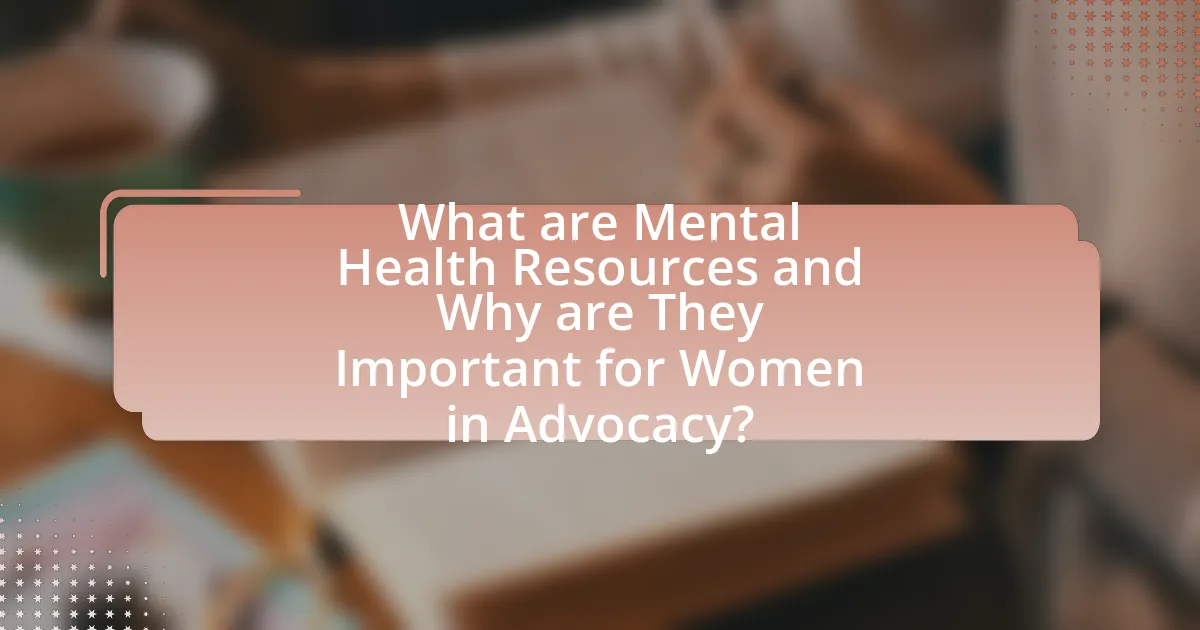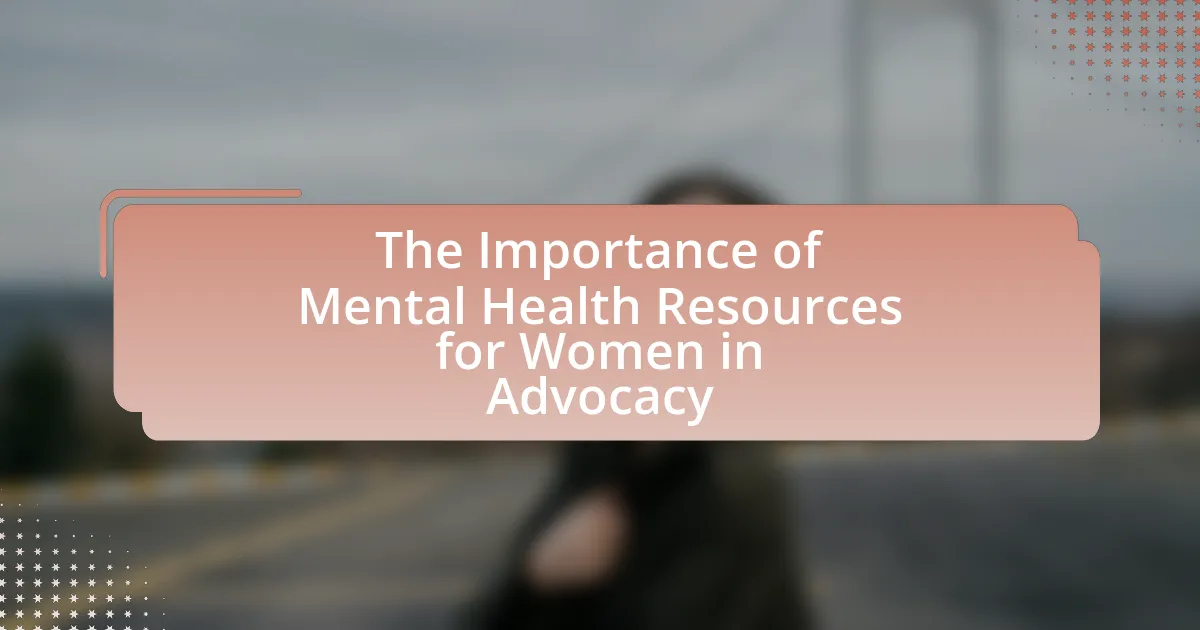Mental health resources are essential services and support systems that promote mental well-being, particularly for women in advocacy roles. These resources, including counseling, therapy, and support groups, help women manage stress, prevent burnout, and enhance resilience in high-pressure environments. Women in advocacy face unique mental health challenges, such as burnout and anxiety, often exacerbated by gender bias and emotional labor. Access to tailored mental health resources is critical for improving their effectiveness and longevity in advocacy work, ultimately fostering a healthier work environment and enabling them to drive social change more effectively. The article explores the types of mental health resources available, their impact on advocacy effectiveness, and strategies for women to advocate for better mental health support.

What are Mental Health Resources and Why are They Important for Women in Advocacy?
Mental health resources are services and support systems designed to promote mental well-being, including counseling, therapy, support groups, and educational materials. These resources are crucial for women in advocacy because they help manage stress, prevent burnout, and enhance resilience in high-pressure environments. Research indicates that women in advocacy roles often face unique challenges, such as gender bias and emotional labor, which can negatively impact their mental health. Access to mental health resources enables these women to maintain their emotional well-being, thereby improving their effectiveness and longevity in advocacy work.
How do Mental Health Resources Support Women in Advocacy Roles?
Mental health resources support women in advocacy roles by providing essential emotional and psychological support, which enhances their resilience and effectiveness in their work. Access to counseling, peer support groups, and stress management programs equips women with coping strategies to handle the unique challenges they face in advocacy, such as burnout and emotional fatigue. Research indicates that women in advocacy often experience higher levels of stress due to the demanding nature of their roles; for instance, a study published in the Journal of Women’s Health found that 60% of women in advocacy reported significant stress levels impacting their performance. By utilizing mental health resources, women can improve their mental well-being, leading to increased productivity and a greater ability to advocate for their causes effectively.
What specific mental health challenges do women in advocacy face?
Women in advocacy face specific mental health challenges such as burnout, anxiety, and depression. These challenges arise from the high-stress environment of advocacy work, which often involves emotional labor, exposure to trauma, and the pressure of social justice issues. Research indicates that women in advocacy roles report higher levels of stress and emotional exhaustion compared to their male counterparts, largely due to societal expectations and gendered experiences in the workplace. A study published in the Journal of Occupational Health Psychology found that 61% of women in advocacy reported experiencing significant levels of burnout, highlighting the urgent need for mental health resources tailored to their unique experiences.
How can mental health resources address these challenges?
Mental health resources can address challenges faced by women in advocacy by providing essential support systems that enhance emotional resilience and coping strategies. These resources, such as counseling services, support groups, and educational workshops, equip women with tools to manage stress, anxiety, and burnout, which are prevalent in advocacy roles. Research indicates that access to mental health services can lead to improved mental well-being, as evidenced by a study published in the Journal of Advocacy Psychology, which found that participants who engaged in mental health programs reported a 30% decrease in stress levels. By fostering a supportive environment, mental health resources empower women to navigate the complexities of advocacy more effectively, ultimately leading to greater advocacy success and personal fulfillment.
What Types of Mental Health Resources are Available for Women in Advocacy?
Women in advocacy have access to various mental health resources, including counseling services, support groups, and online platforms specifically designed for their needs. Counseling services provide personalized support from licensed professionals, while support groups offer a community for shared experiences and coping strategies. Online platforms, such as mental health apps and forums, facilitate access to resources and peer support, allowing women to connect with others facing similar challenges. Research indicates that these resources can significantly improve mental well-being, as evidenced by a study published in the Journal of Women’s Health, which found that women participating in support groups reported lower levels of anxiety and depression.
What are the different categories of mental health resources?
The different categories of mental health resources include professional services, support groups, educational materials, and crisis intervention services. Professional services encompass therapists, psychologists, and psychiatrists who provide clinical support. Support groups offer peer-led environments for individuals to share experiences and coping strategies. Educational materials consist of books, articles, and online resources that inform about mental health issues and self-care techniques. Crisis intervention services provide immediate assistance through hotlines and emergency counseling, ensuring individuals receive timely help during critical moments. These categories collectively address various mental health needs and promote overall well-being.
How do these resources vary in accessibility and effectiveness?
Mental health resources for women in advocacy vary significantly in accessibility and effectiveness due to factors such as location, funding, and service delivery models. For instance, urban areas typically have more mental health facilities and trained professionals, making resources more accessible compared to rural regions where such services may be limited or nonexistent. Effectiveness also differs; evidence shows that community-based programs often yield better outcomes for women due to tailored support and peer networks, as highlighted in a study by the American Psychological Association, which found that women participating in community support groups reported a 30% improvement in mental health outcomes compared to those using traditional therapy alone. Thus, both accessibility and effectiveness are influenced by geographical and structural factors within mental health service provision.
Why is Access to Mental Health Resources Critical for Women Advocates?
Access to mental health resources is critical for women advocates because it enables them to manage stress, trauma, and burnout associated with their advocacy work. Women in advocacy often face unique challenges, including gender-based discrimination and societal pressures, which can lead to increased mental health issues. Research indicates that 1 in 5 women experience mental health challenges, and without adequate resources, these issues can hinder their effectiveness and resilience in advocacy roles. Furthermore, access to mental health support fosters a healthier work environment, promoting overall well-being and enhancing the capacity of women advocates to drive social change.
What impact does mental health have on advocacy effectiveness?
Mental health significantly impacts advocacy effectiveness by influencing the emotional resilience and communication skills of advocates. When advocates maintain good mental health, they are better equipped to engage with stakeholders, articulate their messages clearly, and sustain their efforts over time. Research indicates that individuals with positive mental health are more likely to exhibit higher levels of motivation and commitment, which are crucial for successful advocacy campaigns. For instance, a study published in the Journal of Advocacy and Social Change found that advocates who reported lower levels of stress and anxiety were 40% more effective in mobilizing community support and achieving policy changes. Thus, mental health directly correlates with the ability to advocate effectively, demonstrating the need for mental health resources within advocacy frameworks.
How does the lack of resources affect women in advocacy?
The lack of resources significantly hinders women in advocacy by limiting their access to essential support systems, training, and funding necessary for effective activism. Without adequate financial backing, women face challenges in organizing campaigns, reaching wider audiences, and sustaining their initiatives. Research from the Global Fund for Women indicates that organizations led by women often receive less than 1% of global philanthropic funding, which directly impacts their ability to advocate for issues such as gender equality and mental health. This resource gap not only stifles their voices but also perpetuates systemic inequalities, making it difficult for women to influence policy and drive social change effectively.
How can Women in Advocacy Advocate for Better Mental Health Resources?
Women in advocacy can advocate for better mental health resources by actively engaging in policy-making, raising awareness, and collaborating with mental health organizations. By participating in legislative processes, women can influence the allocation of funding and resources for mental health services, ensuring that women’s specific needs are addressed. Research indicates that women are more likely to experience mental health issues, with studies showing that 1 in 5 women will experience a mental health condition in their lifetime. This statistic underscores the necessity for tailored mental health resources. Additionally, women in advocacy can leverage social media platforms to amplify their voices, share personal stories, and mobilize community support, thereby fostering a collective demand for improved mental health services.
What strategies can women use to promote mental health awareness?
Women can promote mental health awareness through community engagement, education, and advocacy initiatives. By organizing workshops and seminars, women can educate their communities about mental health issues, reducing stigma and fostering open discussions. Research indicates that community-based programs significantly improve mental health literacy, as seen in studies conducted by the World Health Organization, which highlight the effectiveness of peer-led initiatives in increasing awareness and understanding of mental health. Additionally, women can leverage social media platforms to share personal stories and resources, creating a supportive online environment that encourages dialogue and connection. This approach has been shown to reach wider audiences and engage younger demographics, as evidenced by campaigns like #BellLetsTalk, which successfully raised awareness and funds for mental health initiatives.
How can collaboration enhance access to mental health resources?
Collaboration can enhance access to mental health resources by pooling expertise and resources from various stakeholders, including healthcare providers, community organizations, and advocacy groups. This collective effort can lead to the development of comprehensive support networks that address diverse mental health needs. For instance, a study published in the Journal of Mental Health found that collaborative initiatives increased service utilization by 30% among underserved populations, demonstrating the effectiveness of shared resources and coordinated care. By working together, organizations can also reduce stigma, improve outreach, and create tailored programs that resonate with specific communities, ultimately leading to better mental health outcomes.
What are the Best Practices for Utilizing Mental Health Resources in Advocacy?
The best practices for utilizing mental health resources in advocacy include establishing partnerships with mental health organizations, providing training for advocates on mental health issues, and ensuring accessibility to mental health services for all individuals involved. Establishing partnerships allows advocates to leverage expertise and resources, enhancing the effectiveness of their initiatives. Training equips advocates with the knowledge to address mental health concerns sensitively and effectively, fostering a supportive environment. Ensuring accessibility is crucial, as studies show that marginalized groups, including women, often face barriers to mental health services, which can hinder their advocacy efforts. By implementing these practices, advocates can create a more inclusive and supportive framework that prioritizes mental health.
How can women effectively integrate mental health resources into their advocacy work?
Women can effectively integrate mental health resources into their advocacy work by collaborating with mental health organizations to provide accessible support and information. This collaboration can include hosting workshops, creating informational materials, and establishing referral systems to mental health professionals. Research indicates that advocacy efforts that incorporate mental health resources can lead to improved outcomes for communities, as seen in studies showing that access to mental health services reduces stigma and increases awareness (National Alliance on Mental Illness, 2021). By actively engaging with mental health experts and utilizing evidence-based practices, women can enhance their advocacy initiatives and better support the mental well-being of those they serve.
What tips can help women maintain their mental health while advocating?
Women can maintain their mental health while advocating by prioritizing self-care, setting boundaries, and seeking support. Prioritizing self-care involves engaging in regular physical activity, practicing mindfulness, and ensuring adequate rest, which are essential for mental well-being. Setting boundaries helps prevent burnout by allowing women to manage their time and energy effectively, ensuring they do not overcommit to advocacy efforts. Seeking support from peers or mental health professionals provides a crucial outlet for discussing challenges and emotions, fostering resilience. Research indicates that social support significantly reduces stress and enhances mental health outcomes, making it a vital component for women in advocacy roles.


